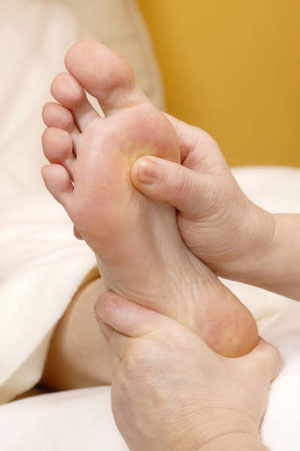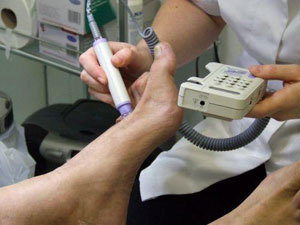Podiatrist
Tasks & duties

Podiatrists may do some or all of the following:
-
consult with patients to work out the cause of foot or lower limb problems
-
use video gait-analysis equipment to examine patients' body movements
-
take x-rays or magnetic resonance imaging (MRI) scans
-
treat foot problems, sports injuries and walking or running disorders
-
treat gait (walking) abnormalities in children
-
prescribe and arrange the making of orthotics (inner soles) to correct foot problems
-
advise patients about continuing treatment, foot care and choice of shoes
-
offer advice on foot health and prevention of foot disorders
-
discuss treatment options with patients
-
help patients choose suitable treatment options
-
perform foot surgery, such as removal of warts and ingrown toenails, on feet
-
perform more extensive surgery such as realignment of toes
-
refer patients to other medical specialists
-
keep records of patient histories and treatments up to date
-
do administrative work such as filing and accounting, or ordering stocks of medical supplies
-
give talks or presentations on foot care in the community or at conferences
-
visit patients in their homes or at rest homes or marae
Specialisations
Podiatrists may specialise in a range of areas including diabetic care, sports care, treating gait (walking) abnormalities, and podiatric surgery.
Skills & knowledge

Podiatrists need to have:
-
knowledge of the structure and function of the skeleton and its muscular system
-
knowledge of medical conditions that influence mobility
-
knowledge of various medicines and how they affect the body
-
knowledge of different x-ray and magnetic resonance imaging (MRI) techniques
-
an understanding of how to sculpt orthotics (inner soles)
-
an understanding of how to carry out minor surgical operations
-
listening and communication skills
-
problem-solving skills
-
time management skills
-
decision-making ability
-
computer skills
-
business skills if they have their own practice
Entry requirements
To become a podiatrist you need to have a Bachelor of Health Science majoring in podiatry, which is offered at the Auckland University of Technology (AUT). Students work in AUT's podiatry clinic while studying the theoretical aspects of podiatry.
Secondary education
A tertiary entrance qualification is required to enter further training. Useful subjects include biology, chemistry, physical education and English.
Training on the job
Practising podiatrists are able to undertake further surgical training through the New Zealand College of Podiatric Surgery.
Podiatrists who are members of the NZ Society of Podiatrists may participate in regular professional meetings and seminars run by the society.
Podiatrists also gain further training at conferences and seminars, and must keep up to date with new trends and practices.
Registration
Podiatrists must be registered with the Podiatrists Board before they can begin practising.
Useful experience
Useful experience for podiatrists includes work that involves caring for and relating to people, experience in the shoe manufacturing or sports industry, or any work that deals with people's mobility.
Related courses
Podiatry
For more information, please refer to Career Services.
Document Actions
